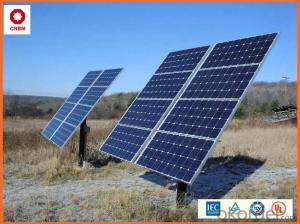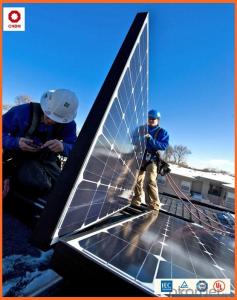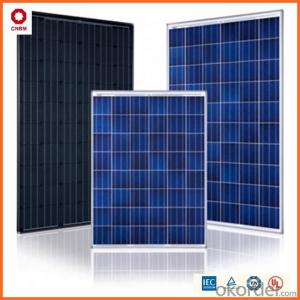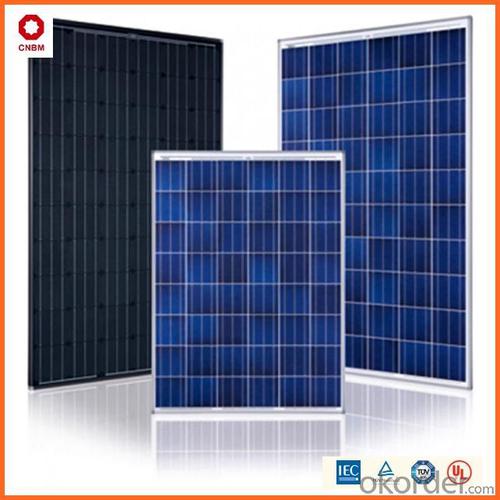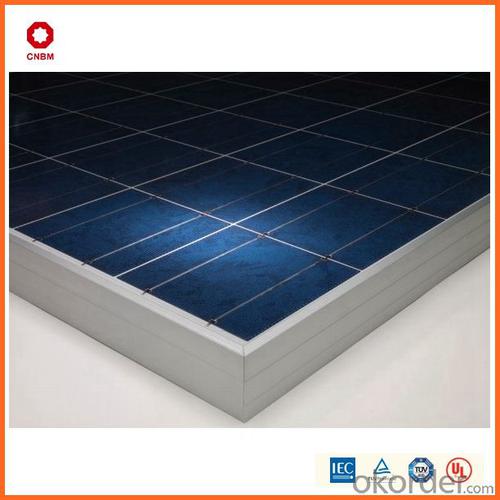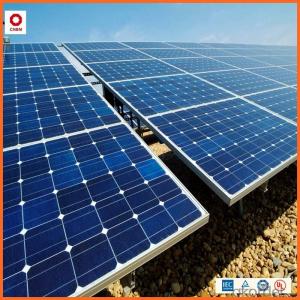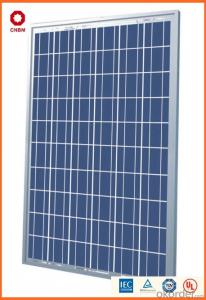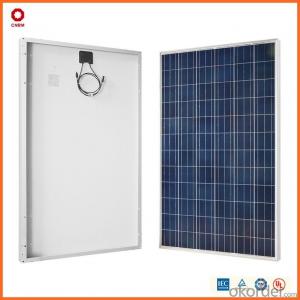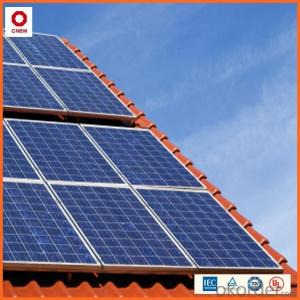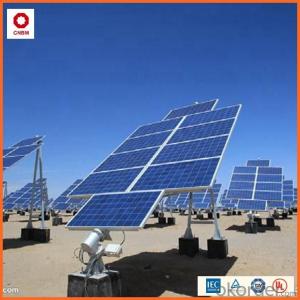Solar Energy Systems Minnesota - !!! Hot on Sale!!! Stock 320W Poly Solar Panel USD0.46/W A Grade Good Solar Panel On Sale
- Loading Port:
- China main port
- Payment Terms:
- TT OR LC
- Min Order Qty:
- 1 watt
- Supply Capability:
- 10000000 watt/month
OKorder Service Pledge
OKorder Financial Service
You Might Also Like
Product Description:
Hot Sale !!! Quality and Safety of 245w-320w Poly Solar Panel
1. Rigorous quality control meets the highest international standards.
2. High-transmissivity low-iron tempered glass, strong aluminium frame.
3. Using UV-resistant silicon.
4. IS09001/14001/CE/TUV/UL
Warranties of 245w-320w Poly Solar Panel
1. 10 years limited product warranty
2. 15 years at 90% of the minimal rated power output
3. 25 years at 80% of the minimal rated power output
Technical date of 245w-320w Poly Solar Panel
ITEM NO.: | Mono 125*125 cell ,36pcs . Power range from 80Wp-100Wp | ||||||||
Maximum Power(W) | 80 | 85 | 90 | 95 | 100 | ||||
Optimum Power Voltage(Vmp) | 17.81 | 17.89 | 17.94 | 17.99 | 18.06 | ||||
Optimum Operatige Current(Imp) | 4.78 | 4.91 | 5.12 | 5.35 | 5.59 | ||||
Open Circuit Voltage(Voc) | 21.98 | 22.05 | 22.14 | 22.28 | 22.45 | ||||
Short Circuit Current(Isc) | 4.95 | 5.15 | 5.36 | 5.65 | 5.84 | ||||
Solar Cell: | 125*125 Mono | ||||||||
Number of Cell(pcs) | 4*9 | ||||||||
Brand Name of Solar Cells | JA Cell, Bluesun Cell | ||||||||
Size of Module(mm) | 1580*808*35 | ||||||||
Caple & Connector Type | Pass the TUV Certificate | ||||||||
Frame(Material Corners,etc.) | Aluminium-alloy | ||||||||
Backing (Brand Type) | TPT | ||||||||
Cell Efficiency for 100W(%) | 15.8% | ||||||||
Weight Per Piece(KG) | 12.0KG | ||||||||
FF (%) | 70-76% | ||||||||
Junction Box Type | Pass the TUV Certificate | ||||||||
Tolerance Wattage(e.g.+/-5%) | ±3%, or 0-3% | ||||||||
Front Glass Thikness(mm) | 3.2 | ||||||||
Temperature Coefficients of Isc(%) | +0.04 | ||||||||
Temperature Coefficients of Voc(%) | -0.38 | ||||||||
Temperature Coefficients of Pm(%) | -0.47 | ||||||||
Temperature Coefficients of Im(%) | +0.04 | ||||||||
Temperature Coefficients of Vm(%) | -0.38 | ||||||||
Temperature Range | -40°C to +85°C | ||||||||
Surface Maximum Load Capacity | 2400Pa | ||||||||
Allowable Hail Load | 23m/s ,7.53g | ||||||||
Bypass Diode Rating(A) | 12 | ||||||||
Warranty | 90% of 10 years,80% of 25 years. | ||||||||
Standard Test Conditions | AM1.5 1000W/ 25 +/-2°C | ||||||||
Packing | carton or pallet | ||||||||
1*20' | 25 Pallets / 450pcs | ||||||||
1*40'STD | 25 Pallets / 100pcs | ||||||||
Features of our products:
• High conversion efficiency mono/poly-crystalline amorphous silicon solar cells
• Modules incorporate high performance bypass diodes to minimize the power drop caused by shading
• High transmittance, low-iron tempered glass
• High performance EVA encapsulant to prevent destroying and water.
• AI frame: without screw, corner connection. 8 holes on the frame can be installed easily
• Good performance of preventing from atrocious weather such as wind and hails
• Certifications: CE IEC TUV VDE UL, Class I
• 10 years 90% power output warranty

Shipping of 245w-320w Poly Solar Panel
By Sea | Delivery from Shanghai or Ningbo seaport |
By Air | Departure from Shanghai Pudong Airport |
By Express | Post by DHL, EMS, UPS, TNT. |
- Q: Are there any disadvantages or limitations to using solar energy systems?
- Yes, there are a few disadvantages and limitations to using solar energy systems. Firstly, solar energy is intermittent and dependent on sunlight, which means it cannot generate electricity during the night or cloudy days. Additionally, the initial setup cost of solar panels and equipment can be relatively high, although it is offset by long-term energy savings. The efficiency of solar panels can also be affected by factors such as shading, dust, or dirt accumulation, requiring regular maintenance. Finally, large-scale solar energy systems may require significant land area, which can pose challenges in densely populated areas. However, advancements in technology and increasing adoption of solar energy are steadily addressing these limitations.
- Q: Are solar panels weather resistant?
- Yes, solar panels are designed to be weather resistant. They are built to withstand various weather conditions including rain, snow, wind, and extreme temperatures. The materials used in their construction are durable and can protect the panels from damage caused by weather elements. Additionally, solar panels are tested and certified to meet industry standards for weather resistance.
- Q: Can solar energy systems be installed on sloped surfaces?
- Yes, solar energy systems can be installed on sloped surfaces. In fact, sloped surfaces can sometimes be advantageous for solar panel installation as they can enhance the exposure to sunlight and increase the efficiency of the system.
- Q: Can solar energy systems be used in areas with high levels of snowfall?
- Solar energy systems can indeed be utilized in regions with abundant snowfall. Though snow can diminish the amount of sunlight reaching the panels, it does not render them entirely ineffective. Contemporary solar panels are engineered to function efficiently in various weather conditions, including snowy ones. Furthermore, the inclination and tilt of the panels can be adjusted to discard snow and maximize sun absorption. In snowy areas, it is customary to install solar panels at steeper angles to facilitate snow removal. Additionally, advancements in solar technology, such as the application of anti-reflective coatings and self-cleaning mechanisms, aid in preventing snow accumulation and maintaining optimal performance. It is important to note that while snow may temporarily decrease energy generation, solar energy systems can still generate electricity even in overcast conditions. In conclusion, with careful planning and upkeep, solar energy systems can be effectively employed in regions with substantial snowfall.
- Q: Can solar energy systems be used for transportation?
- Yes, solar energy systems can be used for transportation. Solar-powered vehicles, such as solar cars, solar boats, and solar planes, have been developed and successfully used for transportation purposes. These vehicles harness the energy from the sun through solar panels, converting it into electricity to power their propulsion systems. While solar energy may have limitations in terms of efficiency and range, advancements in technology are continuously improving the viability of solar-powered transportation.
- Q: Can solar energy systems be used in areas with limited access to solar charge controllers?
- Yes, solar energy systems can still be used in areas with limited access to solar charge controllers. While solar charge controllers are important for regulating and optimizing the charging of batteries in solar systems, there are alternative solutions that can be implemented. For example, manual charge controllers can be used where users manually monitor the battery charge level and disconnect the solar panels when necessary. Additionally, advanced battery management systems can be utilized to ensure efficient charging and protection of the batteries. Overall, although access to solar charge controllers may be limited, there are alternative methods to manage and utilize solar energy effectively in such areas.
- Q: Can solar energy systems be used in areas with strict building codes or homeowner association restrictions?
- Solar energy systems are indeed viable in areas with stringent building codes or restrictions imposed by homeowner associations. Although certain regions may have specific regulations or limitations in place, many jurisdictions have recognized the significance of renewable energy and have modified their rules to accommodate the installation of solar panels. In areas governed by strict building codes, it is customary for these codes to incorporate provisions for solar energy systems. These provisions typically outline precise requirements for the design, installation, and upkeep of solar panels to ensure compliance with safety standards. By adhering to these guidelines, homeowners can install solar energy systems without violating their area's building codes. Similarly, numerous homeowner associations have acknowledged the advantages of solar energy and have revised their restrictions to permit the installation of solar panels. Homeowner associations may have established explicit guidelines pertaining to the placement, appearance, and integration of solar panels on residential properties. By closely collaborating with the homeowner association and adhering to their guidelines, homeowners can successfully implement solar energy systems in these communities. Furthermore, federal and state laws exist to safeguard homeowners' rights to install solar energy systems, irrespective of strict building codes or homeowner association restrictions. These laws, commonly referred to as solar access rights or solar rights laws, seek to ensure that homeowners possess the freedom to generate their own renewable energy. They prohibit unjustifiable restrictions on the installation of solar panels and offer legal mechanisms for homeowners to resolve any conflicts that may arise. In conclusion, while challenges may arise in areas with stringent building codes or homeowner association restrictions, solar energy systems can still be utilized. By following the specific provisions and guidelines outlined in these regulations, homeowners can successfully install solar panels and capitalize on the benefits of renewable energy. Additionally, solar access rights laws safeguard homeowners' rights to install solar energy systems, further securing their ability to harness solar power.
- Q: Can solar energy be used in cloudy climates?
- Yes, solar energy can still be used in cloudy climates. While the efficiency of solar panels may be slightly reduced in overcast conditions, they can still generate electricity. Additionally, advancements in technology, such as the use of bifacial solar panels, have made it possible to capture sunlight from multiple angles, allowing solar energy to be harnessed even in cloudy weather.
- Q: Can solar energy systems be used for powering electric bikes or scooters?
- Yes, solar energy systems can be used to power electric bikes or scooters. Solar panels can be installed on the roof of a home or on a portable charging station to generate electricity from the sun. This electricity can then be used to charge the batteries of electric bikes or scooters, making them an eco-friendly and sustainable mode of transportation.
- Q: What is the role of solar cookers in solar energy systems?
- The role of solar cookers in solar energy systems is to harness the power of the sun to cook food. They use reflective surfaces to concentrate sunlight onto a cooking vessel, converting solar energy into heat. Solar cookers are an environmentally friendly alternative to traditional cooking methods that rely on fossil fuels, as they reduce greenhouse gas emissions and promote sustainable energy use. They are particularly beneficial in areas with limited access to electricity or clean cooking fuel, improving health and reducing deforestation.
Send your message to us
Solar Energy Systems Minnesota - !!! Hot on Sale!!! Stock 320W Poly Solar Panel USD0.46/W A Grade Good Solar Panel On Sale
- Loading Port:
- China main port
- Payment Terms:
- TT OR LC
- Min Order Qty:
- 1 watt
- Supply Capability:
- 10000000 watt/month
OKorder Service Pledge
OKorder Financial Service
Similar products
Hot products
Hot Searches
Related keywords
